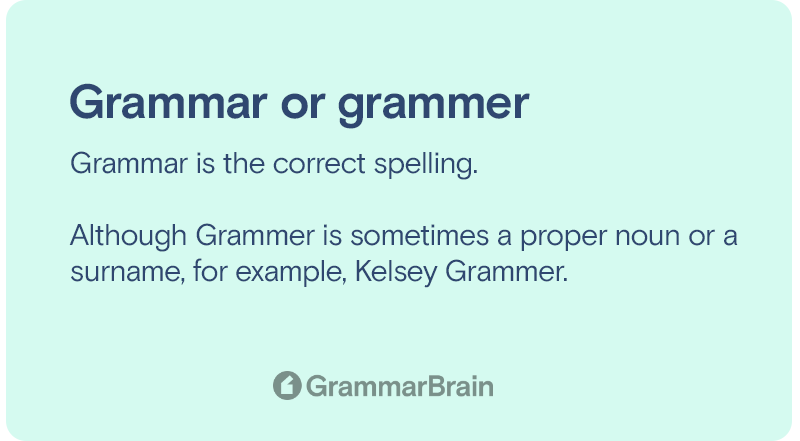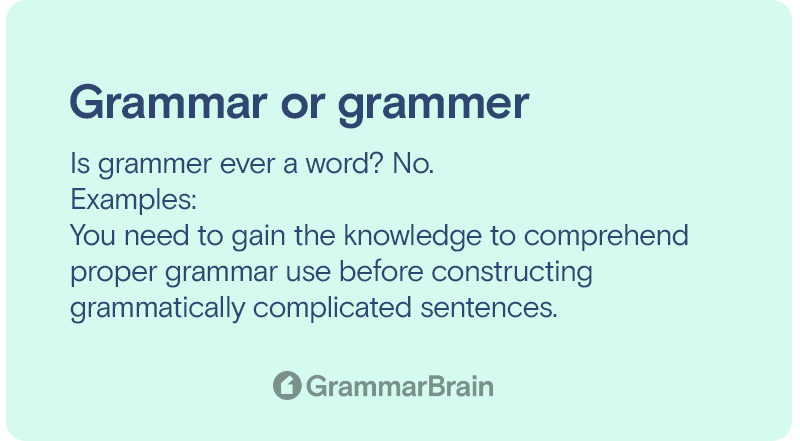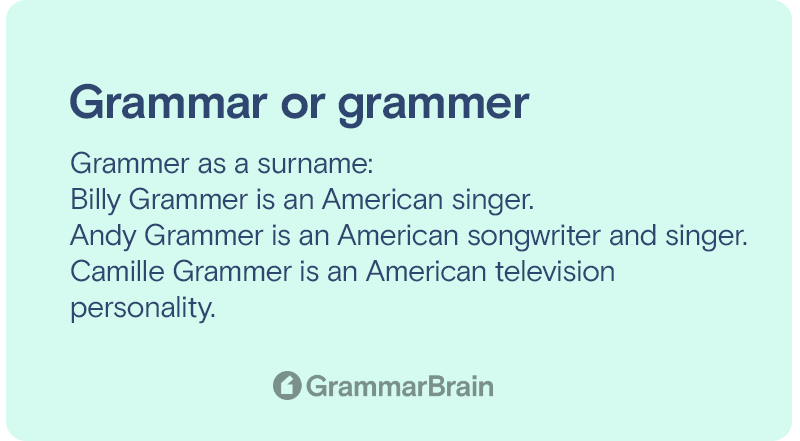Is it grammer or grammar, which one is correct? Like many, in case you misspell grammar as grammer to mean the context of the English Language, then you leave yourself to nothing but criticism and show your weak grip on your writing.
English often has different spellings for a single word, while the meaning of the words remains the same. Mostly there is clarity on such different spellings as British English or American English. Nevertheless, that isn’t the case for the words grammer and grammar, respectively, as they can’t be used as each other’s synonyms.
Then the question arises of which spelling is correct. Grammar or Grammer? Both have the correct spelling, but they don’t mean the same thing. It means the context of language, e.g., grammar book, while Grammer is a surname (with a capital G letter).
Here we’ll compare the two words ‘grammar and grammer.’ And provide examples in sentences and simple tricks to remember the difference between the two words.

Grammar or Grammer: What Is Grammar?
Well, ‘Grammar’ is described as an approach of rules managing the structure of any language. All languages out there have grammar. However, the rules contained in different languages are extremely different from each other. The following sentences reflect appropriate usage cases of ‘grammar‘.
- Unless you teach your kids proper usage of grammar, your kid will make embarrassing mistakes and grammar errors in the future.
- Opening your grammar book to page 22, complete exercises 2-20 on subject-verb agreement.
Grammar or Grammer: What Is Grammer?
Unlike the word ‘grammar,’ ‘grammer’ is a widespread surname used in English” Thus, the word ‘grammer’ is typically a proper noun. You can’t use it in any other context in language. And this makes the word a correct spelling but does not describe the context of the language.
Following are a few significant examples of the word Grammer as a popular surname:
- Billy Grammer is an American singer.
- Andy Grammer is an American songwriter and singer.
- Camille Grammer is an American television personality.

How to Remember the Difference
Do you know how you can remember the difference? Well, here is a helpful trick that will help you remember the difference between the word’s grammar vs. grammer.
When you write about the method of rules managing sentence construction, don’t capitalize the first letter -g, and spell the word with an -A.
On the other hand, you should use the word ‘Grammer’ as a proper noun.
Examples of Grammar in Sentences
The following sentences show correct grammar.
- You need to gain the knowledge to comprehend proper grammar use before constructing grammatically complicated sentences.
- Open your grammar books to complete the exercise given on pages 32-45.
Examples of Grammer in Sentences
The statement below shows the proper noun use of the word grammer.
- Kelsey Grammer aimed to get the work done on time.
- Actor Kelsey Grammer has played in many plays so far.

In review
Many individuals use the words grammar and grammer interchangeably. However, they don’t have the same meanings. The correct spelling in English is ‘grammar. ‘ Grammar is typically the study of the function and structure of language, while the word grammer is a misspelling if you want to use it as a context of language.
Often people make the error of writing the word as ‘Grammer‘ because of the similar pronunciation. Nevertheless, the word grammer is typically a pronoun and a popular surname, but it can’t replace grammar as a synonym.
FAQs
Which is the correct spelling grammar or grammer?
Grammar is typically a set of rules for the structure of a sentence.
While Grammer is typically a proper noun that directs to a person’s name or surname.
How To Use Spelling and Grammar Check in Microsoft Word
To Use the Spelling and Grammar Check in MS Word, simply press F7.
Then click the heading below for further details
- Show errors (grammar error/grammatical error, spelling error, etc.) automatically when you work
- Recheck spelling & grammar that you ignored before
- Entirely turn off grammar checking
- Turn on or off the multicolored underlining for grammar errors and spelling errors.
Inside this article
Fact checked:
Content is rigorously reviewed by a team of qualified and experienced fact checkers. Fact checkers review articles for factual accuracy, relevance, and timeliness. Learn more.
Core lessons
Glossary
- Abstract Noun
- Accusative Case
- Anecdote
- Antonym
- Active Sentence
- Adverb
- Adjective
- Allegory
- Alliteration
- Adjective Clause
- Adjective Phrase
- Ampersand
- Anastrophe
- Adverbial Clause
- Appositive Phrase
- Clause
- Compound Adjective
- Complex Sentence
- Compound Words
- Compound Predicate
- Common Noun
- Comparative Adjective
- Comparative and Superlative
- Compound Noun
- Compound Subject
- Compound Sentence
- Copular Verb
- Collective Noun
- Colloquialism
- Conciseness
- Consonance
- Conditional
- Concrete Noun
- Conjunction
- Conjugation
- Conditional Sentence
- Comma Splice
- Correlative Conjunction
- Coordinating Conjunction
- Coordinate Adjective
- Cumulative Adjective
- Dative Case
- Determiner
- Declarative Sentence
- Declarative Statement
- Direct Object Pronoun
- Direct Object
- Diction
- Diphthong
- Dangling Modifier
- Demonstrative Pronoun
- Demonstrative Adjective
- Direct Characterization
- Definite Article
- Doublespeak
- False Dilemma Fallacy
- Future Perfect Progressive
- Future Simple
- Future Perfect Continuous
- Future Perfect
- First Conditional
- Irregular Adjective
- Irregular Verb
- Imperative Sentence
- Indefinite Article
- Intransitive Verb
- Introductory Phrase
- Indefinite Pronoun
- Indirect Characterization
- Interrogative Sentence
- Intensive Pronoun
- Inanimate Object
- Indefinite Tense
- Infinitive Phrase
- Interjection
- Intensifier
- Infinitive
- Indicative Mood
- Participle
- Parallelism
- Prepositional Phrase
- Past Simple Tense
- Past Continuous Tense
- Past Perfect Tense
- Past Progressive Tense
- Present Simple Tense
- Present Perfect Tense
- Personal Pronoun
- Personification
- Persuasive Writing
- Parallel Structure
- Phrasal Verb
- Predicate Adjective
- Predicate Nominative
- Phonetic Language
- Plural Noun
- Punctuation
- Punctuation Marks
- Preposition
- Preposition of Place
- Parts of Speech
- Possessive Adjective
- Possessive Determiner
- Possessive Case
- Possessive Noun
- Proper Adjective
- Proper Noun
- Present Participle
- Prefix
- Predicate



